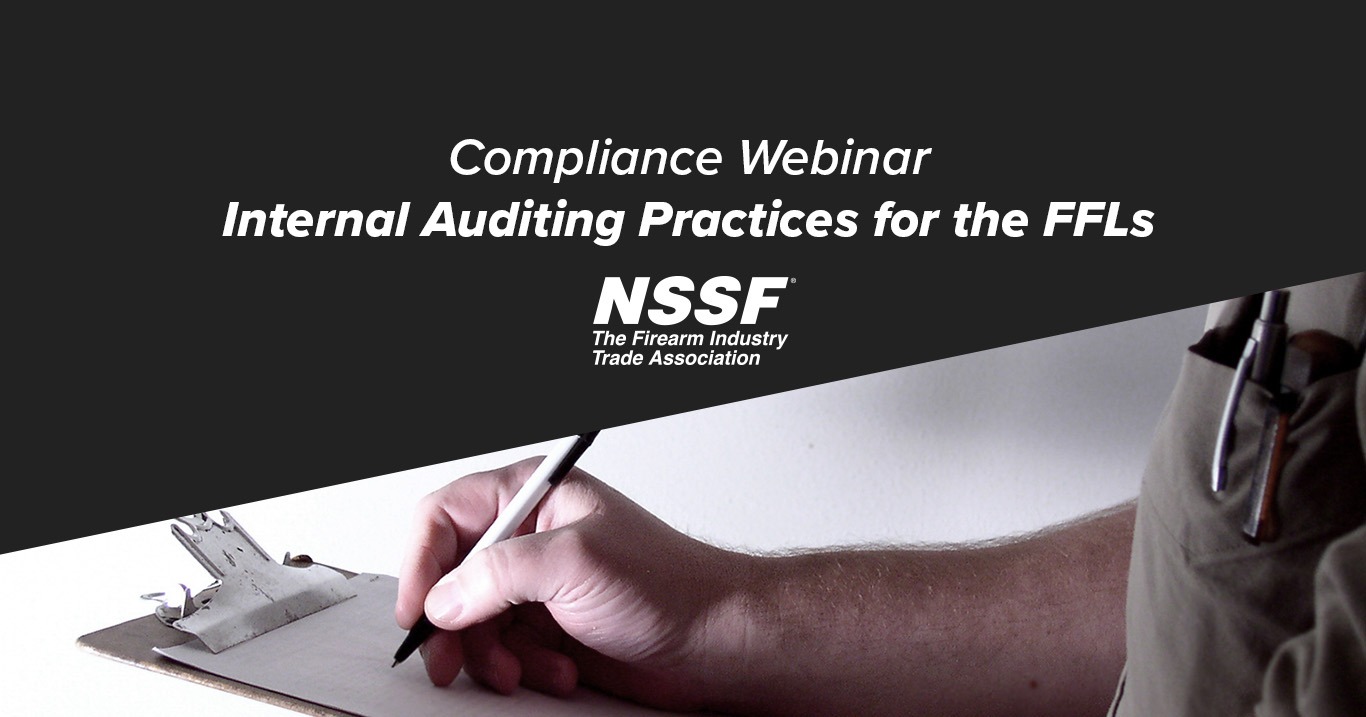 Back to News
Back to News
July 18, 2023
5 Most Common ATF Violations | Best Practices for FFLs to Stay Compliant
Do you know which five errors in paperwork could cost you your license and your business? All FFLs should know the five “deadly sins” so they can avoid career-ending mistakes. NSSF Consultants Harry McCabe and Judy LeDoux hosted a webinar on best practices to avoid these mistakes on Monday, July 17. During this session, they covered internal auditing practices to assist FFLs to prevent making errors that will result in a recommendation for revocation under the ATF Zero Tolerance policy, along with violations that are most commonly cited by ATF.
“Absent of any extraordinary circumstance, a compliance inspection that results in a finding that an FFL has willfully committed one of these violations will result in a revocation recommendation,” LeDoux said.
Transferring a firearm to a prohibited person
This can happen in several ways, and not always the obvious ones. For instance, an FFL may record an incorrect response from the background check; that is, they’re busy and have a lot of responses to background checks, and they look at the wrong background check and write down that someone passed when they actually didn’t. Or they duplicate a background check, and the one they missed turns out to be a prohibited person and the FFL actually didn’t do a background check on that person.
“Another thing is if an individual answers ‘yes’ to one of the prohibiting questions on the Form 4473 and the FFL doesn’t see it because they’re not reviewing the 4473s,” McCabe said. “They run the background check and get a ‘proceed’ so they transfer the firearm. Then when ATF does an inspection, they see that ‘yes’ answer and they can take action against the FFL.” In other words, the FFL had reasonable cause to believe that the individual was prohibited due to their “yes” response.
Sometimes a buyer lies on the 4473 and passes the background check and the FFL has no way of knowing that the buyer is a prohibited person.
“If it’s a mental health issue, the states are not all up to date with providing mental health and involuntary commitment histories to NICS, so those things may not get caught on a background check,” McCabe said. “FFLs are expected to do their due diligence, but they are not expected to enforce the law. If there’s nothing in the conversation they have with the purchaser and the purchaser passes the background check, they are not held responsible.”
The biggest violation LeDoux said she has seen was the failure to wait three business days to let the purchaser have the firearm.
“When you call for a background check, NICS will give you the date that you can actually transfer the firearm legally,” LeDoux said. “That date does not include weekends or holidays. A lot of FFLs think it’s three of their business days and they’ll include Saturday and Sunday in their calculation and transfer the gun. Then NICS may call them back and give them a denied response before the actual transfer date, but they’ve already transferred the gun.” If that happens, ATF will go retrieve the firearm and the FFL will lose their license.
Failing to conduct the required background check
Even when an FFL conducts a background check, if the purchaser comes back to pick up the firearm 31 days later and the FFL doesn’t run another check, this is a failure to conduct a background check. Background checks are only valid for 30 days.
“Many times, dealers miscalculate the number of days,” McCabe said. “They think 30 days is a month, but they don’t think about some months having 31 days instead of thirty. I’ve seen revocations be issued for that error.”
Or a retailer may conduct a background check and forget to record it. During an inspection, this will be flagged as a failure to conduct a check.
“This can happen with a retailer who uses the NICS E-Check System and they have the printout and lay the printout aside, intending to go back later and add the information,” LeDoux said. “Then later they can’t find the printout.”
Falsification of records
The big thing ATF looks for here, LeDoux said, is facilitating straw purchases.
“Let’s say someone lies on the 4473 and it’s very obvious,” she said. “For example, a husband gets denied and the wife comes back at a later time and purchases the gun for the husband. It’s important for a retailer to have a system in place to detect straw purchasers, and it’s important that they train their employees to detect straw purchasers.”
Another way a retailer falsifies a record is to change or fill in customer information that the customer forgot to fill in. An FFL can never complete, change or correct information that the buyer is required to complete. ATF views this as falsification of a 4473 because the customer certifies that the information and responses they provided are true and correct.
“I know of one FFL who wanted all his forms to be neat and legible, so he filled them out in advance for his customers,” LeDoux said. “He would contact the customer and get the information and fill out the form. He was even checking all the boxes or answers to the questions that indicate whether a person is prohibited from possessing a firearm. He ended up having his license revoked.”
Failing to respond to an ATF trace request
“A dealer has 24 hours to respond to a trace request,” McCabe said. “If it’s an urgent trace, which often happens in the case of a mass shooting or the death of a public official or law enforcement officer, the FFL may get a call from ATF at 2:30 in the morning wanting someone to meet them at the business premises as soon as possible so the trace information can be gathered quickly to aid in the investigation. The legal requirement, however, is 24 hours.”
Refusing ATF’s right of entry to conduct an inspection
It doesn’t happen often, but now and then an FFL will refuse to allow an Industry Operations Investigator (IOI) to come in and conduct a compliance inspection.
“These cases almost always result in revocation of the individual’s license,” LeDoux said. “When you apply for an FFL, you are subject to inspections by ATF. ATF will typically work with an FFL if there is a good reason they can’t accommodate an inspection at the time the IOIs show up, such as someone dealing with an illness or if a family member is ill and the FFL has to care for them, or something of that nature. But they still have to allow the inspection.”
From there, McCabe and LeDoux discussed the top ten violations that ATF have cited retailers for during the past few years and provided tips on how retailers can avoid mistakes that result in any kind of disciplinary action.
Watch this Webinar Recording at SHOT University™ Online
See all webinar recordings and Register for the next upcoming webinar session All Things CA DOJ Compliance here:
Categories: Education, Featured, Manufacturers, Ranges, Retailers, Top Stories










